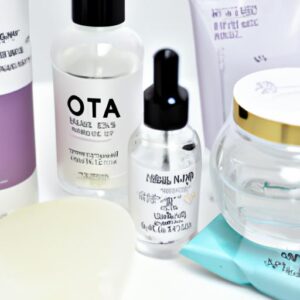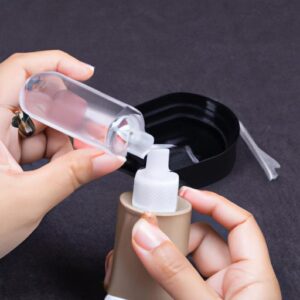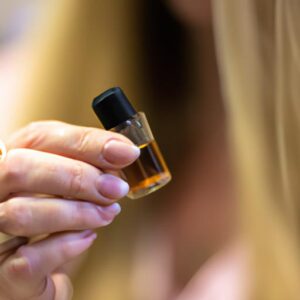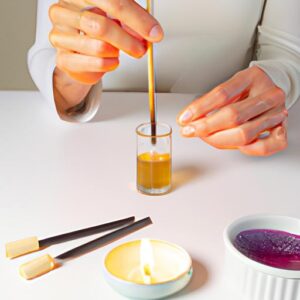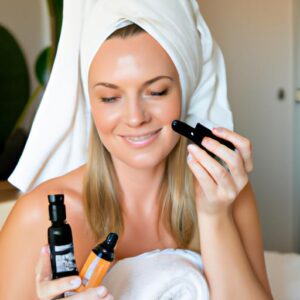Breastfeeding is a beautiful and nurturing experience that requires careful consideration of what you expose your body to, including the beauty products you use. As a new mother, you naturally want to look and feel your best, but it’s crucial to be cautious about the beauty products you choose during this special time.
Why is it important to be cautious about beauty products while breastfeeding?
When it comes to breastfeeding, the substances you apply to your skin have the potential to enter your bloodstream and ultimately make their way into your breast milk. This means that certain ingredients found in beauty products can be transferred to your baby, potentially posing risks to their health. Understanding the potential risks associated with specific beauty products is essential for the well-being of both you and your little one.
What are the potential risks associated with certain beauty products?
Many beauty products contain harmful ingredients that can be absorbed into breast milk or cause allergic reactions in babies. For instance, some chemicals like parabens, phthalates, and formaldehyde have been linked to hormonal disruptions and developmental issues. Synthetic fragrances, often found in perfumes and lotions, can also contain harmful chemicals that may affect your baby’s delicate system.
It’s also important to note that certain skincare products, haircare products, and makeup items can contain ingredients that are not suitable for breastfeeding mothers. Essential oils, retinoids, and salicylic acid are some examples of substances that can potentially harm your baby if they are transferred through breast milk.
In the following sections, we will explore the specific beauty products to avoid during breastfeeding, along with safer alternatives that you can confidently incorporate into your beauty routine. By being informed and selective about the products you use, you can prioritize both your beauty and your baby’s well-being.
Harmful Ingredients to Avoid
During breastfeeding, it is crucial to be aware of the harmful ingredients that can potentially enter your breast milk and affect your baby’s health. Here are two categories of ingredients to avoid:
A. Chemicals that can be absorbed into breast milk
-
Parabens and phthalates: Parabens are commonly used as preservatives in skincare and beauty products, while phthalates are often found in fragrances. Studies have shown that these chemicals can disrupt hormonal balance and potentially impact your baby’s development. Look for products labeled as “paraben-free” or “phthalate-free” to avoid these harmful substances.
-
Formaldehyde: This chemical is often used in haircare products, such as keratin treatments and hair straightening products. Formaldehyde has been classified as a carcinogen and may pose health risks, including respiratory issues and allergic reactions. Opt for formaldehyde-free alternatives to protect both yourself and your little one.
-
Synthetic fragrances: Many beauty products contain synthetic fragrances, which can be a hidden source of harmful chemicals. These fragrances often contain phthalates, which, as mentioned earlier, can disrupt hormonal balance. Choose products with natural fragrances or those labeled as “fragrance-free” to avoid potential risks.
B. Ingredients that can cause allergic reactions in babies
-
Essential oils: While essential oils can have various benefits, some oils may cause allergic reactions in babies. It’s best to avoid essential oils during breastfeeding, especially if you notice any adverse reactions in your little one.
-
Retinoids: Retinoids, commonly found in anti-aging products and acne treatments, are derived from vitamin A. High doses of vitamin A can be harmful to infants, so it’s recommended to steer clear of products containing retinoids while breastfeeding.
-
Salicylic acid: Salicylic acid is often used in skincare products targeting acne. While it is generally safe in low concentrations, it’s advisable to avoid high concentrations or prolonged use of salicylic acid during breastfeeding to prevent any potential harm to your baby.
By being mindful of these harmful ingredients and opting for safer alternatives, you can confidently choose beauty products that prioritize both your health and the well-being of your baby.
Skincare Products to Avoid
When it comes to skincare products, breastfeeding mothers need to be particularly mindful of what they apply to their skin. Certain moisturizers, creams, facial cleansers, and toners can contain ingredients that may pose risks to your baby. Let’s explore the skincare products to avoid and discover safer alternatives that you can confidently incorporate into your skincare routine.
A. Moisturizers and creams
Moisturizers and creams are essential for maintaining hydrated and nourished skin. However, some ingredients commonly found in these products may not be suitable for breastfeeding mothers. When selecting moisturizers and creams, be cautious about the following ingredients:
-
Retinoids: Retinoids, including retinol and tretinoin, are derivatives of vitamin A that are often used in anti-aging products. While these ingredients are beneficial for many, they are not recommended for breastfeeding mothers due to their potential to be transferred through breast milk.
-
Salicylic Acid: Salicylic acid is commonly found in acne-fighting skincare products. While it is generally safe for topical use in low concentrations, it is advisable to avoid high concentrations or prolonged use of products containing salicylic acid while breastfeeding.
To ensure the safety of your baby, consider safer alternatives for moisturizing and nourishing your skin:
- Natural and Organic Ingredients: Look for moisturizers and creams that contain natural and organic ingredients. These products often prioritize plant-based ingredients that are less likely to pose risks to your baby.
B. Facial cleansers and toners
Facial cleansers and toners play a vital role in maintaining clean and balanced skin. However, it’s important to be aware of certain harmful ingredients commonly found in these products:
-
Sodium Lauryl Sulfate (SLS): SLS is a surfactant used in many facial cleansers and toners. It can be harsh on the skin and may cause irritation. While it may not directly harm your baby, it’s best to opt for gentler alternatives.
-
Alcohol: Some facial cleansers and toners contain alcohol, which can be drying and irritating to the skin. Look for alcohol-free options to avoid potential discomfort.
To ensure the well-being of both you and your baby, consider safe alternatives suitable for breastfeeding:
- Mild and Gentle Formulas: Opt for facial cleansers and toners that are specifically formulated for sensitive or dry skin. These products are often free from harsh chemicals and are less likely to cause irritation or disrupt the delicate balance of your skin.
By being selective about the skincare products you use, you can maintain healthy and radiant skin while providing the utmost care for your breastfeeding baby. Remember, it’s always wise to consult with your healthcare provider or a dermatologist if you have any concerns or questions about specific products.
Haircare Products to Avoid
When it comes to haircare products, it’s important to be mindful of their ingredients while breastfeeding. Let’s take a closer look at the specific products you should avoid and discover safer alternatives that will keep your hair looking fabulous without compromising your baby’s health.
A. Shampoos and Conditioners
-
Harmful chemicals to watch out for: Some shampoos and conditioners contain harmful chemicals that can be absorbed into your bloodstream and potentially transferred to your breast milk. Ingredients like sulfates, parabens, and synthetic fragrances are commonly found in these products and have been linked to hormonal disruptions and skin irritation. It’s best to steer clear of these chemicals to ensure your baby’s well-being.
-
Breastfeeding-friendly alternatives: Fortunately, there are plenty of safe and natural alternatives available. Look for shampoos and conditioners that are labeled as sulfate-free, paraben-free, and fragrance-free. These products are typically made with gentle, plant-based ingredients that are less likely to cause any adverse effects. Additionally, opting for organic or botanical-based formulations can provide added peace of mind.
B. Hair Dyes and Treatments
-
Potential risks associated with hair dye ingredients: Hair dyes and treatments often contain chemicals that can be harmful if ingested or absorbed into your body. Ingredients like ammonia, peroxide, and PPD (paraphenylenediamine) are commonly found in hair dyes and have the potential to be transferred to your baby through breast milk. These substances may cause allergic reactions or other health issues in infants.
-
Natural or ammonia-free alternatives for breastfeeding moms: If you’re looking to color or treat your hair, it’s recommended to opt for natural or ammonia-free products. Natural hair dyes, such as henna-based dyes, are derived from plant sources and do not contain harsh chemicals. Ammonia-free options use alternative ingredients that are less likely to pose risks to your baby. Always perform a patch test before using any new hair dye or treatment to ensure you don’t experience any adverse reactions.
By being mindful of the ingredients in your haircare products, you can ensure that you maintain your desired hair look while keeping your baby’s health a top priority. Remember, there are always safe alternatives available that will help you achieve beautiful and vibrant hair while breastfeeding.
Makeup Products to Avoid
As a breastfeeding mother, it’s essential to pay attention to the makeup products you use, as they can potentially affect your baby. Let’s take a closer look at the specific makeup items you should avoid and explore safer alternatives.
A. Foundations and Concealers
-
Unsafe ingredients commonly found in makeup: Foundations and concealers often contain ingredients like parabens, phthalates, and synthetic fragrances. These substances can be absorbed into your bloodstream and subsequently passed on to your baby through breast milk. Parabens and phthalates have been associated with hormonal disruptions, while synthetic fragrances may contain a cocktail of potentially harmful chemicals. It’s crucial to read product labels and avoid makeup products that contain these harmful substances.
-
Safer makeup options for nursing mothers: Fortunately, there are plenty of breastfeeding-friendly alternatives available in the market. Look for foundations and concealers that are labeled as paraben-free, phthalate-free, and fragrance-free. Opt for products that use natural ingredients and are specifically formulated for sensitive skin. Mineral-based makeup, such as mineral powder foundations, can be a great option as they often have fewer additives and irritants.
B. Lipsticks and Lip Glosses
-
Harmful substances to avoid: Lipsticks and lip glosses can contain certain ingredients that are best avoided while breastfeeding. Some common culprits include lead, which has been found in some lip products, as well as retinoids, which are derivatives of vitamin A and may pose a risk to your baby’s development if ingested through breast milk. Additionally, avoid lip products that contain artificial dyes and synthetic fragrances, as these can potentially irritate your baby’s delicate system.
-
Breastfeeding-friendly lip products: When selecting lipsticks and lip glosses, opt for brands that prioritize safety and transparency. Look for products that are lead-free and free of retinoids. Natural lip products made with organic ingredients can be a great choice, as they tend to be free of harmful additives and are less likely to cause any adverse reactions for you or your baby. Look for lip products that are labeled as safe for breastfeeding mothers or consult with your healthcare provider for recommendations.
By being mindful of the ingredients in your makeup products and opting for safer alternatives, you can confidently enhance your beauty while ensuring the well-being of your breastfeeding baby. Remember, prioritizing both your own health and your baby’s health is the key to a harmonious and joyful breastfeeding journey.
Conclusion
When it comes to beauty products and breastfeeding, it’s crucial to prioritize safety and make informed choices. The well-being of both you and your baby should always be at the forefront of your mind.
By understanding the potential risks associated with certain ingredients, you can confidently navigate the vast beauty market and choose products that are safe for use during breastfeeding. Remember to read labels carefully and conduct thorough research before making any purchases.
While it may feel overwhelming to avoid certain beauty products, there are plenty of breastfeeding-friendly alternatives available. From moisturizers and cleansers to haircare products and makeup, there are brands that prioritize the health and safety of nursing mothers. Look for products that are free from harmful chemicals, synthetic fragrances, and other potentially harmful ingredients.
During this special time, embrace the natural beauty that comes with motherhood. Focus on nourishing your body, mind, and soul, and remember that your well-being is just as important as your baby’s.
So, take the time to pamper yourself with products that align with your values and support your breastfeeding journey. Embrace the joy of motherhood while feeling confident and beautiful. You deserve it!
Remember, always consult with your healthcare provider if you have any concerns or questions about specific beauty products while breastfeeding. They can provide personalized advice based on your unique needs and circumstances.
Enjoy this wonderful journey of motherhood, and may your beauty radiate from within as you nurture and nourish your little one.
